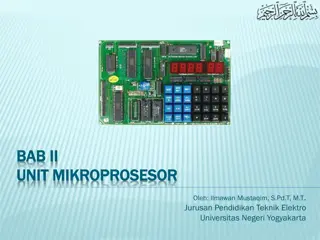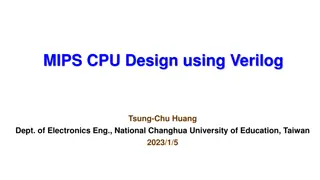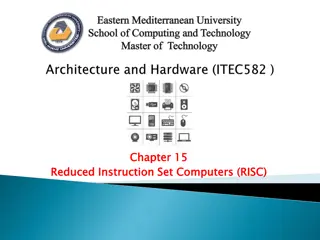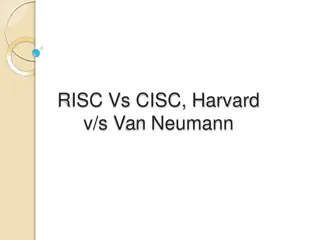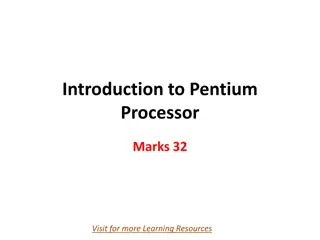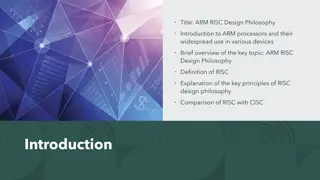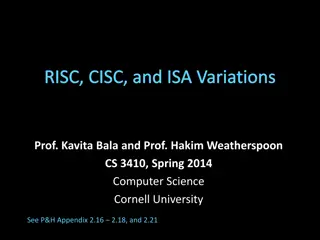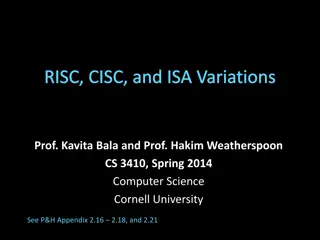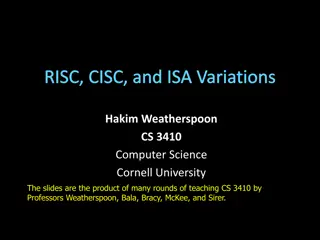Computer Components and Microprocessor: Understanding Computer Architecture
Explore the main computer components and learn about the operation of these components, including inputting, storing, processing, outputting, and controlling. Understand the role of the microprocessor in computer processing and its characteristics such as instruction set, bandwidth, and clock speed.
11 views • 20 slides
Understanding Microprocessor Architecture and Software Design
Microprocessor architecture and software design play crucial roles in the development of microprocessors. This article explores the internal features, software design types, and characteristics of Complex Instruction Set Computer (CISC) and Reduce Instruction Set Computer (RISC) architectures. It de
7 views • 73 slides
Understanding Computer Architecture: A Comprehensive Overview by Prof. Dr. Nizamettin AYDIN
Explore the realm of computer architecture through the expertise of Prof. Dr. Nizamettin AYDIN, covering topics like RISC characteristics, major advances in computers, comparison of processors, and the driving force for CISC. Delve into the evolution of processors, register optimization, and the tra
0 views • 42 slides
MIPS CPU Design Using Verilog and Instruction Set Architecture Overview
Explore the world of MIPS CPU design using Verilog with a deep dive into Instruction Set Architecture (ISA), SPIM instruction formats, addressing modes, and more. Learn about the key components such as Program Counter (PC), Instruction Memory (IM), Register Files (RF), Arithmetic Logic Unit (ALU), D
1 views • 29 slides
Introduction to Intel Assembly Language for x86 Processors
Intel Assembly Language is a low-level programming language designed for Intel 8086 processors and their successors. It features a CISC instruction set, special purpose registers, memory-register operations, and various addressing modes. The language employs mnemonics to represent instructions, with
2 views • 12 slides
Evolution of Computing Architectures: RISC Approach
Study on the RISC approach in computing architecture, focusing on key characteristics and advancements since the inception of stored-program computers. Topics covered include the family concept, microprogrammed control units, cache memory, pipelining, and the development of RISC architecture as an a
0 views • 58 slides
Contrasting RISC and CISC Architectures
Contrasting RISC (Reduced Instruction Set Computing) and CISC (Complex Instruction Set Computing) architectures, the images and descriptions elaborate on their advantages and disadvantages, with a focus on multiplying two numbers in memory using a CISC approach. CISC processors aim to complete tasks
0 views • 35 slides
In-Depth Look at Pentium Processor Features
Explore the advanced features of the Pentium processor, including separate instruction and data caches, dual integer pipelines, superscalar execution, support for multitasking, and more. Learn about its 32-bit architecture, power management capabilities, internal error detection features, and the ef
0 views • 24 slides
Understanding ARM RISC Design Philosophy and Its Impact
Delve into the world of ARM processors, exploring the RISC design philosophy that underpins their efficiency and widespread application. Learn about key principles, compare RISC with CISC, and discover how ARM's simplicity, orthogonality, and efficient architecture contribute to its dominance in mob
0 views • 12 slides
Understanding RISC, CISC, and ISA Variations in Computer Science
Explore the differences between RISC and CISC architectures, along with variations in Instruction Set Architecture (ISA). Dive into the intricacies of processor design, performance factors, and assembly languages. Get insights into the concepts of control units, memory units, pipelines, and datapath
0 views • 37 slides
Variations in Computer Architectures: RISC, CISC, and ISA Explained
Delve into the realm of computer architectures with a detailed exploration of Reduced Instruction Set Computing (RISC), Complex Instruction Set Computing (CISC), and Instruction Set Architecture (ISA) variations explained by Prof. Kavita Bala and Prof. Hakim Weatherspoon at Cornell University. Explo
0 views • 55 slides
Understanding Instruction Set Architectures (ISAs) in Computer Science
Explore the concepts of RISC, CISC, and ISA variations in computer architecture. Dive into the differences between MIPS, ARM, X86, and other ISAs, focusing on load/store, arithmetic, control flow, and more. Gain insights into the evolution and variations of ISAs, and discover the alternatives beyond
0 views • 37 slides

